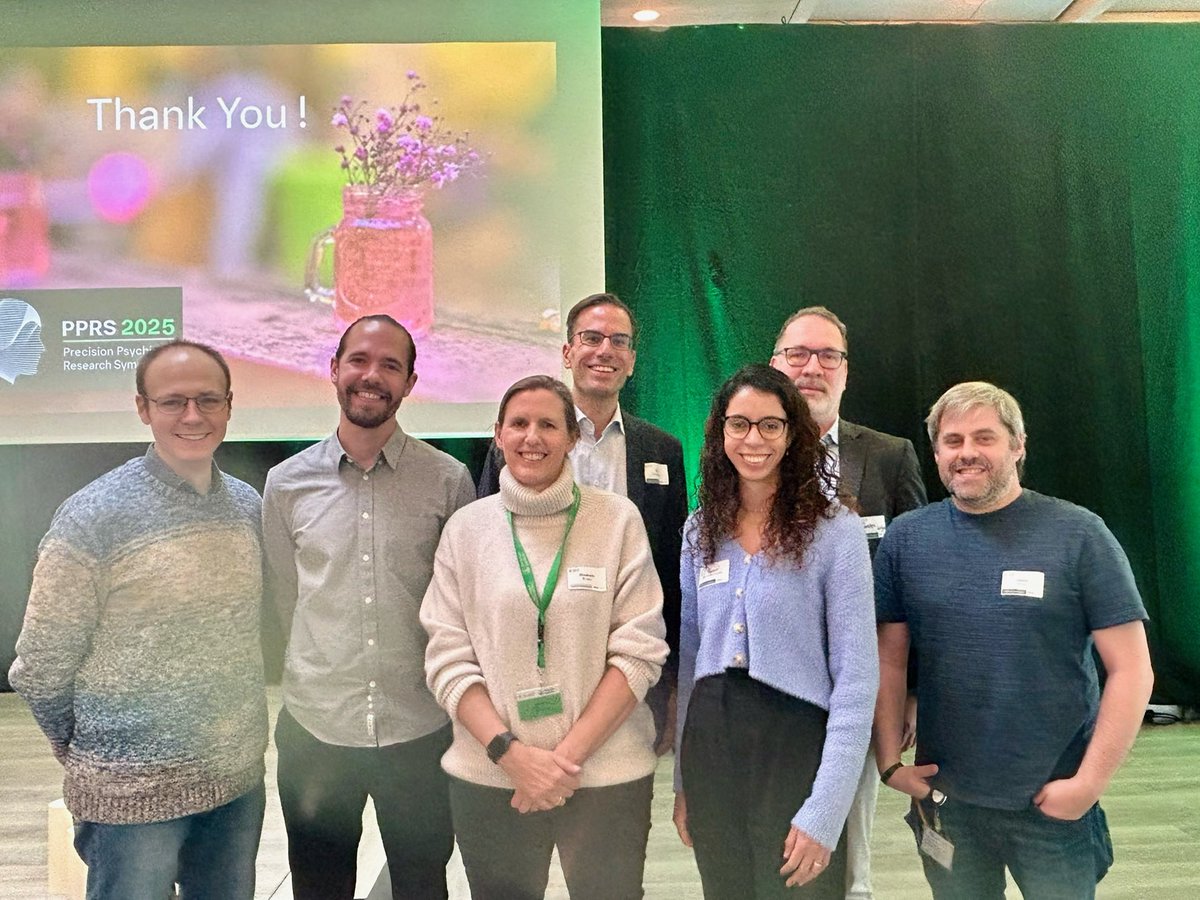Binder Lab
@Binder_Lab
Official account for the lab of Elisabeth Binder at the Max Planck Institute of Psychiatry.
There still slots open and opportunities to present new and exciting work as talks. Check out the link to the Website below #grc #functional genomic #neurodevelopment #brain
We are excited to continue the GRC on Functional Genomics of Human Brain Development and Disease in April 2025. Please check out the great line-up of speakers. Oral presentation slots and poster presentations are still open! Deadline March 9th grc.org/functional-gen…
We are excited to continue the GRC on Functional Genomics of Human Brain Development and Disease in April 2025. Please check out the great line-up of speakers. Oral presentation slots and poster presentations are still open! Deadline March 9th grc.org/functional-gen…
Congrats to our graduates 🥳🥳🥳
We ended this year with a hybrid Graduation Ceremony to celebrate 🎊the milestones achieved by our graduates 🥼 - from successful defenses 🎓 to impactful publications! 📰 A big thank you to all our graduating students, current students and faculty members for joining us! 🎉🥂
We are excited to continue the GRC on Functional Genomics of Human Brain Development and Disease in April 2025. Please check out the great speakers. Oral presentation slots are still open, so please apply. grc.org/functional-gen…
Max Plack Institute of Psychiatry goes Boehringer Ingelheim. It was great to reconnect with so many former colleagues at the inspiring Precision Psychiatry Research Symposium at BI in Biberach

Single-nucleus transcriptomic profiling of human orbitofrontal cortex (~800,000 nuclei from 87 individuals with and without psychiatric diagnoses) reveals convergent effects of aging and psychiatric disease @Binder_Lab @mpi_psychiatry nature.com/articles/s4159…
Great collaborative project led by Anna Fröhlich with @natalie_matosin @NikosDaskalakis @JanineArloth @MichaelZiller5
Exciting new results from single nucleus RNA sequencing of 800,000 nuclei from 90 post mortem brain samples showing converging effects of ageing and #Alzheimer disease and other #psychiatric disorders.👇nature.com/articles/s4159…
Please look into this great opportunity to join our translation @mpi_psychiatry as faculty. Many collaborations possible from basic research to clinical trials.
Unique opportunity for new faculty at our institute! Come join us at @mpi_psychiatry as a Max Planck Research Group Leader and do fantastic research at the interface!
📢Opportunity alert: @mpi_psychiatry is #hiring a #research group leader to spearhead innovative #translational research projects in #psychiatry. Please share and retweet! 🔃
🚨 3 more weeks to go! ⌛️ Apply until 23. June! 👇
I'm looking forward to the talk by @AndyMillerLab
📅We are excited to hear from Dr. Andrew Miller @EmoryMedicine at our next MPLS talk 💻 online on 9th April! Join us to learn more about interactions between the brain🧠and immune system, and its applications in psychiatry. 👇 🔗:zoom.us/j/95223379012 🆔:95223379012 🔑:367361
Check this out! @EricJNestler and I co-edited this PNAS special issue: The Neurobiology of Stress: Vulnerability, Resilience, and Major Depression | Proceedings of the National Academy of Sciences | Proceedings of the National Academy of Sciences pnas.org/topic/558
Our #IMPRSTP #Retreat2023 ends on a high note with some wonderful weather 🌤️🏔️. A big Thank You to our organising team, speakers and every single participant for making this such a successful event - full of learning and fun! 😊
The introduction of the special PNAS issue by @EricJNestler and me asks: What can Science Do to confront the second pandemic of mental health disorders? A call to action combining fundamental research, translational research and public advocacy. pnas.org/doi/10.1073/pn…
Keynote Lecture on Day 3 - "Where does it hurt (in your genome)?" 🧬 by Prof. Dr. Julien Gagneur. We are looking forward!
See our new publication in @PNASNews: Signe Penner-Goeke and her team found that the genetic variants which modulate the sensitivity to the consequences of #stress have an effect on the risk of psychiatric disorders: pnas.org/doi/10.1073/pn…
Munich for Women in Science The event is dedicated to inspiring positive change for Women in Science + Networking. 📍Münchner Künstlerhaus, Munich 🗓️1.12.2023 👉Info & registration: t1p.de/2x0wm @TU_Muenchen @LMU_Muenchen @maxplanckpress @Fraunhofer
Register now for Module 2 of the #ECNP course on ADHD starting on 16 November 2023 at 16.00 CET! It includes five live learnings on the brain in ADHD, genetic risk and protection, epigenetics of ADHD and more. How to join ➡️ ecnp.eu/research-innov… #ADHD #brainresearch
Looking forward to this inspiring event 👇🤗
Munich for Women in Science The event is dedicated to inspiring positive change for Women in Science + Networking. 📍Münchner Künstlerhaus, Munich 🗓️1.12.2023 👉Info & registration: t1p.de/2x0wm @TU_Muenchen @LMU_Muenchen @maxplanckpress @Fraunhofer
Our thoughts at @mpi_psychiatry are especially with @alon_chen_lab, our former director, and our friends from @WeizmannScience mpg.de/20953820/state…
This was a fun project together w/ @jhagenberg & @Binder_Lab. We investigated stress reactivity across the BMI range and the contribution of cortisol and cytokine levels. The link between BMI and stress-induced brain responses in females was related to cortisol but not cytokines.
Human brain responses to stress are associated with the body mass index in females, but not males. Predictive modeling showed that this link was better explained by changes in endocrine instead of immune systems. @cornu_copiae @anne_kuehnel @binder_lab nature.com/articles/s4200…